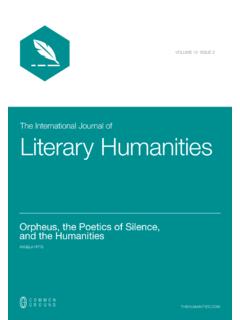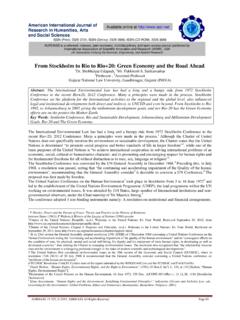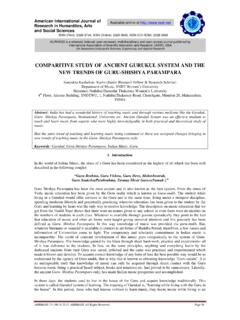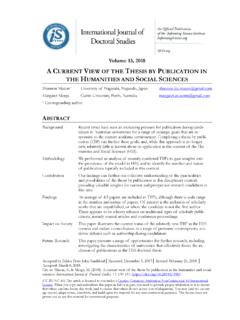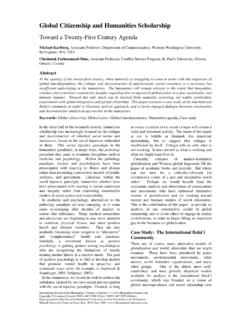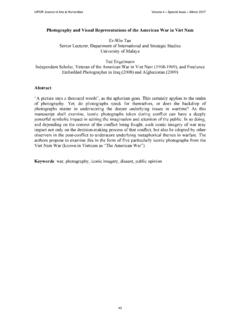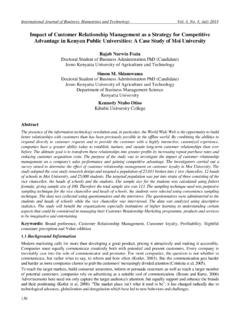Transcription of ISSN 2349-0373 (Print) & ISSN 2349-0381 (Online) www ...
1 international journal of humanities Social Sciences and Education (IJHSSE)Listening: The Ignored Skill in EFL Context mer G khan UlumHakkari University, English Language Teaching Department, Hakkari, Turkey. 2, Issue 5, May 2015, PP 72-80 ISSN 2349-0373 (Print) & ISSN 2349-0381 (Online) ARC Page | 72 AbstractListening is clearly the weakest skill of EFL students who encounter different kinds of listening problems. It is the most underestimated skill in EFL context, though. This study seeks to examine the listening problems faced by a group of first year university students whose English proficiency level is elementary.
2 50 EFL students from three different classes were voluntarily selected for the study. The data was gathered by means of a questionnaire and an interview. The results of the study showed some problematic issues in that the EFL students find it difficult to understand the listening text when speakers speak with varied and unfamiliar accents. Besides, they are not able to comprehend the meanings of words which are not pronounced clearly. Furthermore, they are not able to quickly remember the words or phrases they have just heard. Either in high school or university education process, listening skill was a pain in the necks of the EFL students who participated in the study. Finding out EFL students listening comprehension problems may help EFL teachers assist students improve their listening comprehension skills.
3 As a result, students develop their listening competency. The results of the study may also be beneficial for the researchers having interest in listening : Listening, Listening Skill, Listening Problems, Listening is a concept that is both complicated and hard to be analysed. It means that it is difficult to make a clear and quick definition of listening (Hichem, 2013). However, it can be referred as one of the four key skills through which a language is taught and it is one of the two language skills that is employed when communicating orally, according to what Andrade (2006) puts forward. Besides, listening as a pedagogical term refers to speech recognition , speech perception , speech understanding and spoken language understanding (Huei-Chun, 1998).
4 That listening is a very active process means that when we listen not only we deal with what we listen or hear but also we combine it with other information that are already familiar. As a consequence, by means of this active process, we create the meaning by integrating what we hear or experience with the data in our minds (Helgesen, 2003). Listening process takes place in five stages of hearing, understanding, remembering, evaluating, and responding (Tyagi, 2013). Figure 1. The Listening Process. Reprinted from Listening: An Important Skill and Its Various Aspects, by B. Tyagi, 2013, The Criterion, 12, 2. international journal of humanities Social Sciences and Education (IJHSSE) Page | 73 mer G khan UlumTyagi (2013) states that hearing is the perception of sound waves.
5 You must initially hear to listen, but you don t need to listen in order to hear, understanding means the comprehension of symbols we have seen and heard, we must examine the meaning of the stimuli we have perceived, remembering means that a person has not only received and clarified a message but has also added it to the brain s stockpile, evaluating necessitates the active listener to weigh evidence or sort fact from opinion, and specify the presence or absence of bias in a message, responding requires that the receiver completes the process by means of verbal or nonverbal feedback. Having the four essential language skills of reading, writing, listening and speaking is highly necessary to be accepted as an efficient language learner (Y ld r m, 2013).
6 EFL listening skill has been ignored for a long time in lieu of the theory that listening is learnt automatically and once for all, though (Huei-Chun, 1998). People have named listening skill as the Cinderella Skill which is disregarded by its big sister speaking skill in language learning as Solak and Altay (2014) called the term like many other researchers. However, there has been rising prominence on listening comprehension skill in second or foreign language pedagogy, mirrored in various methods such as Total Physical Response, Silent Way, Suggestopedia, etc., and also in many listening course books, video materials and CDs (Huei-Chun, 1998).
7 Listening is seemingly the slightest accurate of the four language skills, causing it to be the hardest skill to acquire, as Ghaderpanahi (2012) refers. It is one of the most key scopes of communication skills and language progress (Stepanovien , 2012). Furthermore, it has evolved into a crucial segment for a lot of foreign language programs (Lotfi, 2012). This skill is vital both in language learning and in daily communication (Hamouda, 2013). EFL listening skill is regarded as a problematic language skill especially in a foreign language context where real practice chances are narrow (Nowrouzi, Tam, Zareian and Nimehchisalem, 2015). Teaching students listening skill may be difficult for teachers and namely difficult for students to learn as well.
8 For instance, even the students who are adequate in speaking and reading might confront problems with listening skill when facing a record with a quick conversation (Ghaderpanahi, 2012). In Turkey, English is the most studied foreign language. That s to say, there is no other foreign language being able to compete with English language, in Turkey. Before entering a university, students learn English for the 2nd, 3rd, 4th years of primary school education; for the 5th, 6th, 7th, 8th years of secondary school education (MEB lk retim Kurumlar ngilizce Dersi retim Program , 2013); and also for the 9th, 10th, 11th, 12th years of high school education, three echelons of which are obligatory for the students in Turkey (MEB Orta retim Kurumlar ngilizce Dersi retim Program , 2014).
9 The main focus of the English courses which these students in Turkey practise is on language structures, reading comprehension, vocabulary and writing, as well as translation from one language into the other. Unfortunately, listening skill is ignored in the English program. Consequently, when these students unexpectedly face with more developed or complex listening courses or audio listening tools at universities, they find themselves in a big trouble before they form the needed listening skills. This calls for a related research on the listening problems of these students. The aim of this paper is therefore analysing the listening problems of a group of university students studying elementary level - EFL courses at Hakkari University, OF LITERATURE The importance of listening skill in EFL learning is undeniable since the elixir of acquiring a language is to gain language input (Hamouda, 2013).
10 When we process and decode auditory input, it necessitates knowledge of perception. However, when we encode and generate speech output, it necessitates retrieval knowledge (Vandergrift, 1999). Listening comprehension is an immensely integrative skill and it plays a vital role in the process of language learning, promoting the rise of other language skills. As a result, consciousness and formation of proper listening international journal of humanities Social Sciences and Education (IJHSSE) Page | 74 Listening: The Ignored Skill in EFL Contextcomprehension strategies can aid learners to benefit from the language input they are receiving, Vandergrift (1999) clearly mentions.











